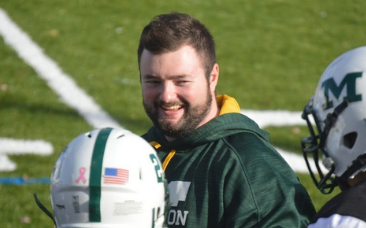Community: Living and Learning with Others
“Community helps form a sense of purpose and direction that you wouldn’t necessarily have otherwise. It pulls you into a life that’s not as selfish or lucrative. It makes you think about how you can be a person for others and pursue work for the greater good.” –Liam McDonald

Liam McDonald, Social Studies teacher and coach at The Cambridge Matignon School in Cambridge, Massachusetts, and Catholic Leadership Cohort member
For Liam McDonald, Social Studies teacher and coach at The Cambridge Matignon School in Cambridge, Massachusetts, community has been a critical component of his personal and professional formation.
For three years of his undergraduate experience at Siena College in Loudonville, New York, he served as a resident assistant, a position which allowed him to accompany freshmen and sophomore students in their personal and professional development and also create programming that helped build community.
After graduating from Siena, Liam joined Urban Catholic Teacher Corps (UCTC), a teacher formation program at Boston College that provides members with teaching support, intentional community living, and faith formation as they earn a master’s degree in Curriculum and Instruction from the Lynch School of Education and Human Development.
“The communal living experience of UCTC made me a better teacher,” Liam shared. “I was forced to talk about topics and issues I might not have otherwise. I would come home, and I would discuss food deserts or racism or whatever happened in a housemate’s class that day. Sometimes I didn’t want to talk about these topics, but they forced me to think and reflect much more than I would have on my own.”
Currently, Liam is part of the Roche Center’s Catholic Leadership Cohort (CLC), a master’s degree program offered collaboratively through the Roche Center and the Lynch School. Over 20 months, participants learn alongside public and charter school educators as they earn a master’s degree in Educational Leadership and Policy. Twelve credits are taken together as a cohort focused specifically on Catholic school leadership, and cohort members meet regularly in smaller professional learning communities, where they have opportunities for deep discussion, discernment, prayer, and communal and critical reflection.
“Being in community with others who have the same passion and desire for Catholic education helps me reflect on my practice by putting others’ experiences in my own context, and considering how a situation might have been similar or different for me,” said Liam. “Just the conversations we have about readings and the classes we’re in helps me think about my own practice, as well as my own strengths and shortcomings.”
Because the first year of the CLC was virtual due to the pandemic, Liam wasn’t expecting to connect with his cohort community as much as he has.
“When I started, I thought, ‘Oh, I’m never going to meet these people, besides maybe the retreat,” he admitted. “But when you talk to them, you learn they really care and they want to see you grow. We’re all here for the same reason, and that’s Catholic education.”
For Liam, the gift of community that he has received through his experience in both UCTC and CLC is something he strives to pass on and create with his own students.
“Forming relationships is one of the things I’m most passionate about,” he said. “I have students who are coming from so many different perspectives, faith backgrounds, and diverse ways of living. So the different community experiences I’ve had help me empathize with their situations and experiences, which makes me a better teacher.”

